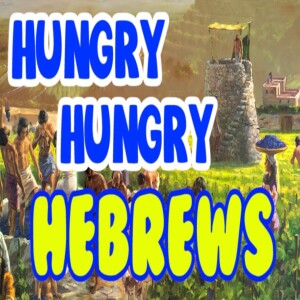

Hungry, Hungry Hebrews! Why We Pray When We Eat
The Significance of Food in Scripture
Matthew Vander Els from Founded In Truth Fellowship delivers a teaching titled "Hungry, Hungry Hebrews," exploring the profound role of food in the Bible. Food is not just a means of sustenance but a recurring symbol throughout scripture, from the Garden of Eden to the final feast with the Messiah. Covenants are often sealed with a meal, and special occasions are marked by eating together. Even Samson's riddle revolves around food, highlighting its pervasive importance.
The Garden of Eden: Abundance and DisobedienceIn the beginning, Adam and Eve had access to abundant food in the Garden of Eden, freely picking fruit from the trees. They didn't need to farm or toil for their meals; everything was readily available. However, this changed when the serpent tempted Eve to eat from the Tree of Knowledge of Good and Evil, which God had forbidden.
Eve saw that the tree was good for food, pleasing to the eyes, and desirable for gaining wisdom. This mirrors 1 John 2:16, which speaks of the lust of the flesh, the lust of the eyes, and the pride of life. Adam's failure to lead and his subsequent decision to eat the fruit led to the downfall of mankind.
The consequences of their disobedience were far-reaching. Adam and Eve were cursed, as was the serpent, and the ground was also cursed. Adam, who once had dominion over the earth, now had to toil and sweat to produce food, facing limited variety and the constant threat of famine.
Tributes and Offerings in the Near EastIn ancient Near Eastern culture, paying tribute to a king or deity was a common practice. This often involved bringing a portion of the harvest as an offering of thanksgiving. Zechariah 14:16 describes how, in the end times, nations will come to Jerusalem to worship the Lord and celebrate the Festival of Tabernacles, bringing tribute to the King.
If any nation refuses to worship the Lord, they will face severe consequences, such as lack of rain and crop failure. This highlights the critical nature of these tributes and offerings in maintaining life and prosperity in the Near East.
Hospitality and Honoring GuestsGenesis 18 tells the story of Abraham hosting three messengers of God. Abraham hurried to offer them food and hospitality, preparing a lavish meal of bread, a tender calf, curds, and milk. This act of hospitality demonstrates the importance of honoring guests and providing for their needs.
Abraham's eagerness to serve the messengers reflects the Near Eastern concept of emissaries, where a messenger represents the king himself. In the same way, believers are called to be ambassadors of Christ, fully representing Him in their words and actions.
The Significance of the Fatted CalfThe fatted calf was not an everyday meal but reserved for special occasions, moments of honor, and feasts. The story of the prodigal son in Luke 15 illustrates this. When the son returned home after shaming his family, the father welcomed him with open arms and ordered the fatted calf to be killed for a celebratory feast.
This act symbolized complete forgiveness, restoration and immense joy. It underscores the idea that certain foods were not staples but were used to mark significant events and honor special guests.
Wine, Oil, and Bread: Essential ElementsPsalms 104:15 identifies wine, oil, and bread as essential elements of the Israelite diet. Wine gladdens the heart, oil makes the face shine, and bread sustains the body. While some may believe that Israelites abstained from alcohol, wine was commonly consumed in the Near East due to the risk of water contamination.
Mixing wine with water was a common practice to purify it. Bread, often made from grain, constituted a significant portion of the daily caloric intake for Israelites.
Application for Everyday Life- Remember to give thanks at every meal: Acknowledge God's provision and remember all He has done for you and your family.
- Avoid pride and self-reliance: Recognize that God gives you the ability to produce wealth and succeed.
- Practice hospitality: Welcome others and share your food with them.
- Remember God in times of plenty: Stay loyal to God and keep His commandments, even when you have everything you need.
- Be obedient and willing: If you are willing and obedient, you will eat the good things of the land.
- Remember the Exodus: As you celebrate Passover, remember your redemption from slavery to sin.
- Strive for unity: Work to restore unity through food, bringing people together in fellowship.
- Share the message of the wedding feast: Invite others to come into covenant with God through Jesus, so they can be part of His kingdom.
- Don't be in distress if you're eating manna: Recognize that God is teaching you something so that you can be exposed to His plan.
For more Bible Teachings, click here.
References- 1 John 2:16
- Genesis 3:6
- Genesis 18
- Luke 15
- Luke 14:15-24
- Psalms 104:15
- Leviticus 17
- Deuteronomy 12
- Deuteronomy 14:22
- Numbers 21:5
- Deuteronomy 8
- Isaiah 25:6-9
- Acts 10
- The Bible
Note: This article contains affiliate links.
More Episodes
All Episodes>>You may also like
Create Your Podcast In Minutes
- Full-featured podcast site
- Unlimited storage and bandwidth
- Comprehensive podcast stats
- Distribute to Apple Podcasts, Spotify, and more
- Make money with your podcast












